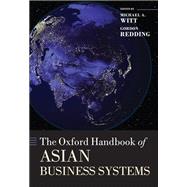Much of the existing literature within the "varieties of capitalism" (VOC) and "comparative business systems" fields of research is heavily focused on Europe, Japan, and the Anglo-Saxon nations. As a result, the field has yet to produce a detailed empirical picture of the institutional structures of most Asian nations and to explore to what extent existing theory applies to the Asian context.
The Oxford Handbook of Asian Business Systems aims to address this imbalance by exploring the shape and consequences of institutional variations across the political economies of different societies within Asia. Drawing on the deep knowledge of 31 leading experts, this book presents an empirical, comparative institutional analysis of 13 major Asian business systems between India and Japan. To aid comparison, each country chapter follows the same consistent outline. Complementing the country chapters are eleven contributions examining major themes across the region in comparative perspective and linking the empirical picture to existing theory on these themes. A further three chapters provide perspectives on the influence of history and institutional change. The concluding chapters spell out the implications of all these chapters for scholars in the field and for business practitioners in Asia.
The Handbook is a major reference work for scholars researching the causes of success and failure in international business in Asia.








